Card. Semeraro at the beatification of Fr. Macha: his testimony is a momento of heroic faith and love (in EN, ES, IT, DE, UA)

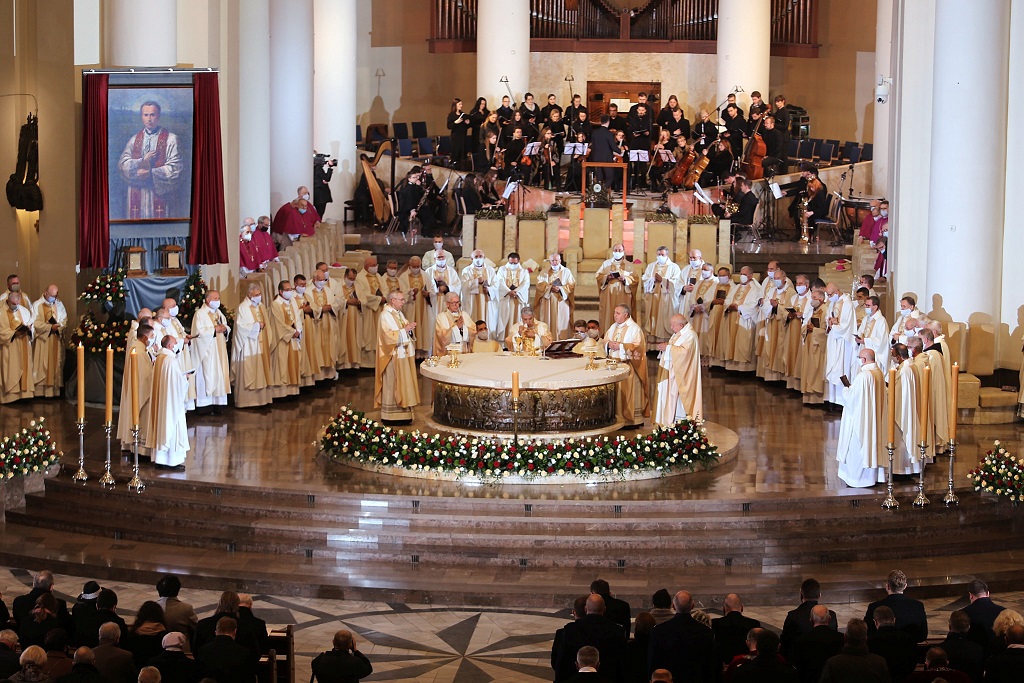
Beatification of Fr Macha. credit episkopat.pl
Card. Semeraro at the beatification of Fr. Macha: his testimony is a momento of heroic faith and love
*
Cardenal Semeraro en la beatificación del P. Macha: Su testimonio es un testimonio de fe y amor heroicos
*
Il Card. Semeraro alla beatificazione di don Macha: la sua testimonianza è una pagina di fede e carità veramente eroica
*
Kardinal Semeraro bei der Seligsprechung von P. Macha: Sein Zeugnis ist ein Zeugnis des heroischen Glaubens und der Liebe
*
Кардинал Семераро на беатифікації о. Маха: його свідчення є сторінкою героїчної віри й любові
– Faithful to the greatest commandment of the Gospel, the commandment of love, Blessed John Francis Macha, although very young – he was only 28 years old – chose to give his life for the Kingdom of Christ – said Cardinal Marcello Semeraro, Prefect of the Congregation for the Causes of Saints in his homily during the beatification of Father John Macha.
A young Polish priest from Upper Silesia was guillotined by the Germans on 3rd December 1942 in Katowice. Almost 79 years after his martyrdom, he was proclaimed blessed in the Cathedral of Christ the King in Katowice.
In the homily, card. Marcello Semeraro referred to the words of the Gospel according to St. John: “If the grain of wheat, fallen into the earth, does not die, it remains alone; but if it dies, it bears much fruit.” The papal envoy emphasized that the testimony of Bl. Fr. John Macha “in the history of this Church in Upper Silesia. He too died, just like the grain of wheat: he was killed by a Nazi system full of hatred for those who were sowing good, in order to show the people of today that earthly dominion is passing away, while the Kingdom of Christ—which, as its supreme law, has the commandment of charity” – card. Semeraro said. As he said, even if Fr. Macha died prematurely according to human logic, his hope was full of immortality and peace.
The Prefect of the Congregation for the Causes of Saints recalled the biography of the new Blessed. Fr. Jan Macha was baptized two days after his birth on 20th January 1914 in the parish of St. Mary Magdalene in Chorzów Stary. In the same church on 27th June 1939, i.e. a few weeks before the outbreak of World War II, he celebrated his Holy Mass. primitive. In the first days of the war, he became a vicar in the parish of St. Józef in Ruda Śląska.
“From the earliest days of his priesthood, he placed himself at the service of his neighbor, setting out on the road of heroic realization of love, the road that would later lead him to the sacrifice of his life” – emphasized card. Semeraro. The papal envoy noted the dedication of the young Polish priest to help all those wronged by the actions of the German occupiers. As he said, Fr. Macha did not pay attention to national, religious or social differences.
“In a divided society, where individualism and selfishness seem to assert themselves increasingly due to the lack of authentic relationships and sincere relations, our Blessed reminds us that Christ will judge us on love and on the good we have accomplished” – noted the Prefect of the Congregation for the Causes of Saints. As he recalled, although after the arrest by the Gestapo, Fr. John Macha was persecuted, beaten and abused, it was in this long suffering that he “he remained uncompromising in his willingness to imitate the Master, accepting his own condemnation.”
The German death sentence on Fr. Jan Macha was performed on the night of 2nd to 3rd December. A few hours before the guillotine operation, in a letter to his family, the young priest wrote down the words that became his testament: “I have lived for a short time, but I believe I have achieved my goal. Do not despair. All will be well. Although the forest has one less tree, it will still be a forest.” – Jan Franciszek Macha, the new Blessed, like a tree felled at a young age, laid the foundations for the construction of a stable house for future generations, to whom he transmits, with a life sealed with his own blood, a clear message from the Gospel of St. John: “No one has greater love than this, to lay down his life for his friends”, said card. Semeraro.
The papal legate emphasized that today’s ceremony somehow returns Fr. Jan Macha to the Upper Silesian Church. “you are receiving him as a Blessed, as a patron, and an intercessor before the Lord.
We cannot fail to entrust to the intercession of the new Blessed a particularly heartfelt prayer for seminarians and priests, especially the younger ones,” said card. Semeraro. He also called the faithful to pray through the intercession of Fr. John for the intentions of families and society.
“Accept the invitation of this priest, raised today to the honors of the altars, to open up new spaces to meet young people and to engage them in the service of the Gospel in the different states of Christian life” – said the Prefect of the Congregation for the Causes of Saints. He also asked the faithful to take the first steps on the synodal path that Pope Francis had proposed to the Church around the world.
In conclusion, card. Marcello Semeraro encouraged the faithful to imitate the piety of Bl. Fr. Jan Macha. Its unique manifestation was the fact that a young priest, during many months of imprisonment, wove the rosary from pieces of string in order to be able to pray the rosary.
The papal envoy visited the parish of St. Mary Magdalene in Chorzów Stary, with whom the new blessed was associated. Card. Semeraro also went to the symbolic grave of a young priest. The body of Fr. Jan Macha, after being guillotined, most likely was burnt, according to many testimonies at the German Camp of Auschwitz.
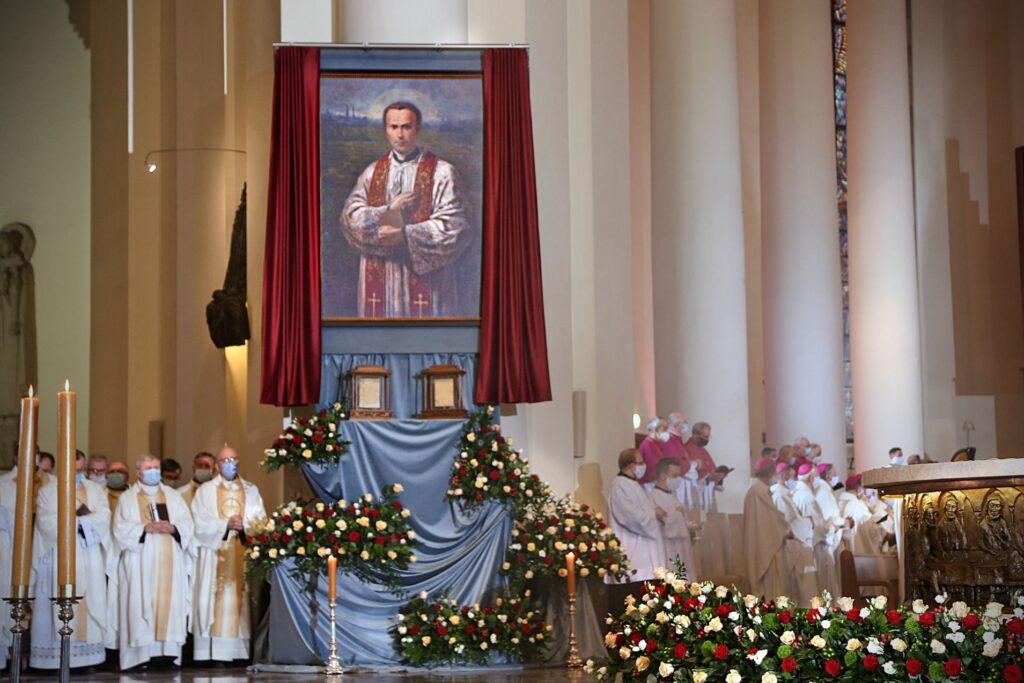
Fr Jan Macha cred. episkopat.pl
*
«Fiel al mayor mandamiento del Evangelio, el del amor, el beato Juan Francisco Macha, aunque muy joven -sólo tenía veintiocho años-, eligió dar su vida por el Reino de Cristo», dijo el Cardenal Marcello Semeraro, Prefecto de la Congregación para las Causas de los Santos en su homilía durante la beatificación del P. Jean Macha. El joven sacerdote polaco de la Alta Silesia fue decapitado por los alemanes el 3 de diciembre de 1942 en Katowice. Casi 79 años después de su martirio, fue proclamado Beato en la Catedral de Cristo Rey en Katowice.
En la homilía, el Card. Marcello Semeraro se refirió a las palabras del Evangelio según San Juan: «Si el grano de trigo cae en la tierra y no muere, queda solo; pero si muere, da mucho fruto». El legado del Papa subrayó que el testimonio del Beato Don Juan Macha «es, en la historia de la Iglesia en la Alta Silesia, una página de fe y amor verdaderamente heroicos». «También él murió, como el grano de trigo: fue asesinado por un sistema nazi lleno de odio hacia los que siembran el bien, para mostrar a los hombres de hoy que el dominio terrenal pasa, mientras que perdura el Reino de Cristo, cuya ley suprema es el mandamiento de la caridad», declaró el cardenal Semeraro. Como dijo, aunque el padre Macha murió prematuramente según la lógica humana, su esperanza estaba llena de inmortalidad y paz.
El prefecto de la Congregación para las Causas de los Santos recordó la biografía del nuevo Beato. Don Juan Macha fue bautizado el 20 de enero de 1914, dos días después de su nacimiento, en la parroquia de Santa María Magdalena en Chorzów Stary. En la misma iglesia, el 27 de junio de 1939, pocas semanas antes del estallido de la Segunda Guerra Mundial, celebró su Primera Misa. En los primeros días de la guerra se convirtió en vicario de la parroquia St. Joseph en Ruda Ląska.
«Desde los primeros días de su sacerdocio se puso al servicio del prójimo, emprendiendo el camino de la realización heroica del amor, camino que le llevaría más tarde al sacrificio de su vida», subrayó el cardenal Semeraro. El legado del Papa destacó la dedicación del joven sacerdote polaco a ayudar a todos aquellos que han sido perjudicados por las acciones de los ocupantes alemanes. Como dijo, Don Juan no prestó atención a las diferencias nacionales, religiosas o sociales.
«En una sociedad dividida, donde el individualismo y el egoísmo parecen imponerse cada vez más por la falta de relaciones genuinas y sinceras, nuestro Beato nos recuerda que Cristo nos juzgará por el amor y el bien que hayamos hecho», señaló el Prefecto de la Congregación para las Causas de los Santos. Como recordó, aunque tras la detención por parte de la Gestapo, Don Juan Macha fue perseguido, golpeado y maltratado, es en este largo sufrimiento que «seguía inflexible en su voluntad de imitar al Maestro, aceptando con serenidad su propia condena».
Condenado a muerte por los alemanes, Don Juan Macha fue ejecutado la noche del 2 al 3 de diciembre. Unas horas antes de su decapitación, el joven sacerdote escribió en una carta a su familia las palabras que se convirtieron en su testamento: He vivido poco tiempo, pero creo que he conseguido mi objetivo. No desesperes. Todo estará bien. El bosque, aunque haya un árbol menos, seguirá siendo un bosque. «Juan Francisco Macha, el nuevo Beato, como un árbol cortado a temprana edad, puso los cimientos para la construcción de un hogar estable para las futuras generaciones, a las que da, con su vida sellada con su sangre, un mensaje claro: “Nadie tiene mayor amor que el que da la vida por sus amigos”», declaró el Cardenal Semeraro.
El legado del Papa subrayó que la ceremonia de hoy en cierto modo devuelve a Don Jean Macha a la Iglesia de la Alta Silesia. «Lo recibís como Beato, como patrono e intercesor ante el Señor. No podemos dejar de confiar a la intercesión del nuevo Beato una oración especialmente sentida por los seminaristas y sacerdotes, especialmente los más jóvenes», dijo el Cardenal Semeraro. También invitó a los fieles a orar por intercesión del P. Jean por las intenciones de las familias y de la sociedad.
«Acogen la invitación de este sacerdote, elevado hoy a los honores de los altares, para abrir nuevos espacios de encuentro con los jóvenes y comprometerlos en el servicio del Evangelio en los diferentes estados de la vida cristiana», lanzó el Prefecto de la Congregación. por las Causas de los Santos. También pidió a los fieles que den los primeros pasos en el camino sinodal que el Papa Francisco propone a la Iglesia en todo el mundo.
En conclusión, el cardenal Marcello Semeraro animó a los fieles a imitar la piedad del Beato Don Juan Macha. Su única manifestación fue el hecho de que un joven sacerdote, durante muchos meses de encarcelamiento, utilizó trozos de hilo para tejer un rosario.
El legado papal visitó la parroquia de Santa María Magdalena en Chorzów Stary, con la que estaba asociado el nuevo beato. El cardenal Semeraro también visitó la tumba simbólica de un joven sacerdote. El cuerpo de Don Juan Macha probablemente fue quemado después de su decapitación, según numerosos testimonios en el campo de concentración de Auschwitz.
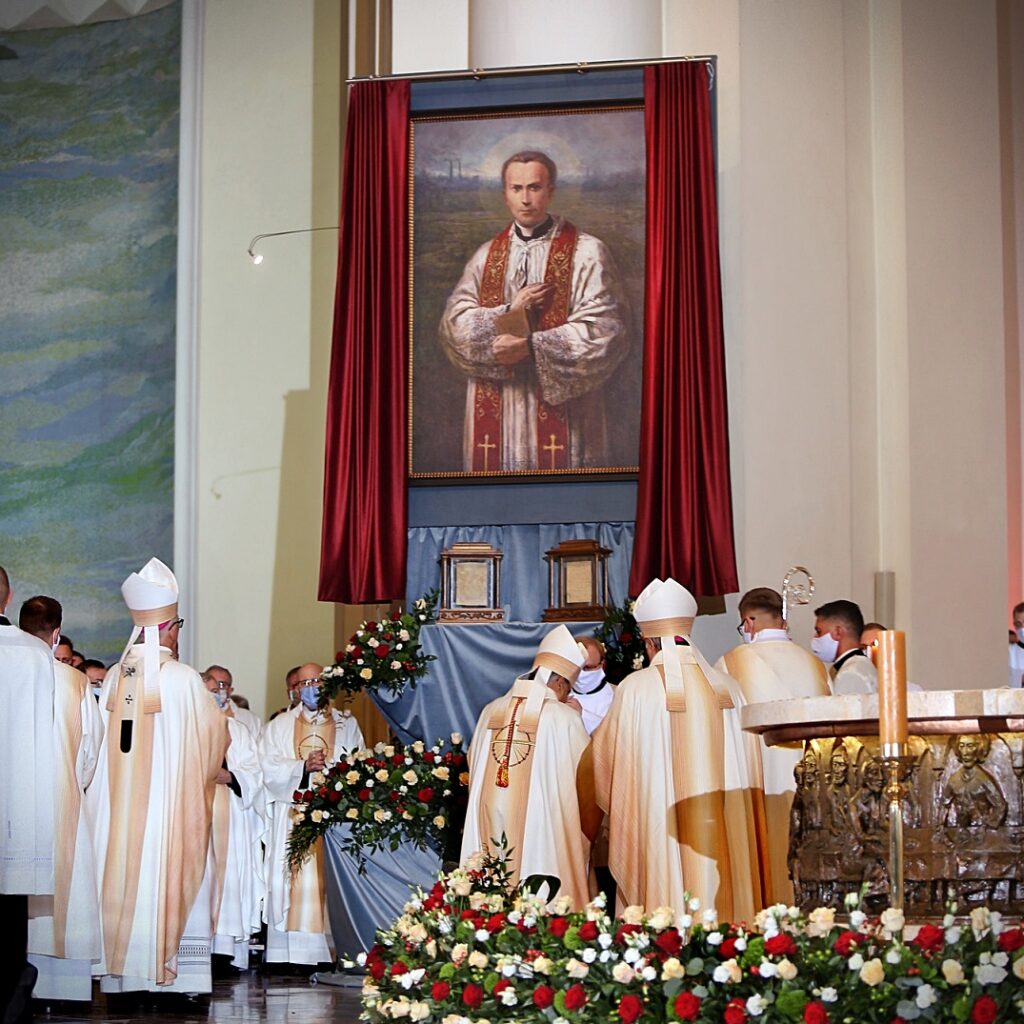
Fr Jan Macha cred episkopat.pl
*
– Fedele al più grande comandamento del Vangelo, cioè quello dell’amore, il Beato Giovanni Francesco Macha, sebbene molto giovane – aveva appena ventotto anni – scelse di dare la vita per il Regno di Cristo – ha affermato il Cardinale Marcello Semeraro, Prefetto della Congregazione per le Cause dei Santi nella sua omelia durante la beatificazione di padre Jan Macha. Il giovane sacerdote polacco dell’Alta Slesia fu ghigliottinato dai tedeschi il 3 dicembre 1942 a Katowice. Quasi 79 anni dopo il suo martirio, è stato proclamato beato nella Cattedrale di Cristo Re a Katowice.
Nell’omelia il Card. Marcello Semeraro ha fatto riferimento alle parole del Vangelo secondo S. Giovanni: “Se il chicco di grano, caduto in terra, non muore, rimane solo; se invece muore, produce molto frutto”. Il Legato pontificio ha sottolineato che la testimonianza al Signore Gesù del beato don Jan Macha “nella storia della Chiesa dell’Alta Slesia è una pagina di fede e carità veramente eroica. – Anche egli morì, proprio come il chicco di grano: fu ucciso da un sistema nazista pieno di odio verso chi semina il bene, per mostrare all’uomo di oggi che il dominio terreno passa, mentre perdura il Regno di Cristo, il quale, come legge suprema, ha il comandamento della carità – ha osservato il Card. Semeraro. Ha affermato che, anche se don Macha, secondo la logica umana, morì prematuramente, la sua speranza era piena di immortalità e pace.
Il Prefetto della Congregazione per le Cause dei Santi ha ricordato la biografia del nuovo Beato. Don Jan Macha fu battezzato due giorni dopo la sua nascita, il 20 gennaio 1914, nella parrocchia di S. Maria Maddalena a Chorzów Stary. Nella stessa chiesa il 27 giugno 1939, cioè poche settimane prima dello scoppio della seconda guerra mondiale, celebrò la sua prima Santa Messa. Nei primi giorni di guerra divenne vicario nella parrocchia di S. Giuseppe in Ruda Śląska.
– Sin dai primi giorni del suo sacerdozio si mise al servizio del prossimo, incamminandosi sulla strada della eroica realizzazione dell’amore, quella che poi lo condurrà al sacrificio della vita – ha sottolineato il Card. Semeraro. Il Legato pontificio ha fatto notare la dedizione del giovane sacerdote polacco nell’aiutare tutti coloro che erano vittime delle azioni degli occupanti tedeschi. Ha affermato che don Macha non prestava attenzione alle differenze nazionali, religiose o sociali.
– In una società divisa, dove individualismo ed egoismo sembrano affermarsi sempre di più per la mancanza di relazioni autentiche e rapporti sinceri, il nostro Beato ci ricorda che Cristo ci giudicherà per l’amore e per il bene che abbiamo compiuto – ha osservato il Prefetto di la Congregazione per le Cause dei Santi. Ha ricordato che, sebbene dopo l’arresto da parte della Gestapo, don Jan Macha fu perseguitato, picchiato e maltrattato, in questa lunga sofferenza “continuava la sua intransigente disponibilità ad imitare il Maestro, accettando con serenità la propria condanna”.
La condanna a morte di don Jan Macha da parte dei tedeschi è stata eseguita nella notte del 2-3 dicembre. Poche ore prima di essere ghigliottinato, in una lettera alla famiglia, il giovane sacerdote ha scritto le parole che sono diventate il suo testamento: “Ho vissuto per breve tempo, ma ritengo di aver raggiunto il mio scopo. Non disperate! Tutto andrà bene. La foresta, senza un albero, rimarrà foresta». – Giovanni Francesco Macha, il nuovo Beato, come un albero tagliato in giovane età, ha posto il fondamento per la costruzione di una casa stabile per le future generazioni, alle quali consegna, con la vita sigillata con il proprio sangue, un messaggio chiaro dal Vangelo secondo Giovanni: “Nessuno ha un amore più grande di questo: dare la vita per i propri amici” – ha affermato il Card. Semeraro.
Il Legato pontificio ha sottolineato che la cerimonia di oggi restituisce in qualche modo don Jan Macha alla Chiesa dell’Alta Slesia. – Lo ricevete come Beato, come patrono e intercessore davanti al Signore. All’intercessione del nuovo Beato non possiamo non affidare una preghiera particolarmente sentita per i seminaristi e i sacerdoti, specialmente quelli più giovani – ha affermato il Card. Semeraro. Ha inoltre invitato i fedeli a pregare per intercessione di don Jan per tutte le necessità delle famiglie e della società.
– Accogliete l’invito di questo sacerdote, elevato oggi agli onori degli altari, ad aprire nuovi spazi per incontrare i giovani e ad ingaggiarli per il servizio del Vangelo nei diversi stati di vita cristiana – ha richiamato il Prefetto della Congregazione per le Cause di Santi. Ha inoltre chiesto ai fedeli di muovere i primi passi del cammino sinodale che papa Francesco ha proposto alla Chiesa di tutto il mondo.
Nella conclusione, il card. Marcello Semeraro ha incoraggiato i fedeli ad imitare la devozione del beato don Jan Macha La sua eccezionale manifestazione è stata il fatto che il giovane sacerdote, nei giorni della prigionia intrecciava una cordicella per recitare il Rosario.
L’Inviato Pontificio ha visitato la parrocchia di S. Maria Maddalena a Chorzów Stary, alla quale era legato il nuovo beato. Si è inoltre recato alla tomba simbolica del giovane sacerdote. Secondo molte testimonianze, dopo essere stato ghigliottinato, il corpo di don Jan Macha è stato molto probabilmente bruciato nel Lager di Auschwitz.
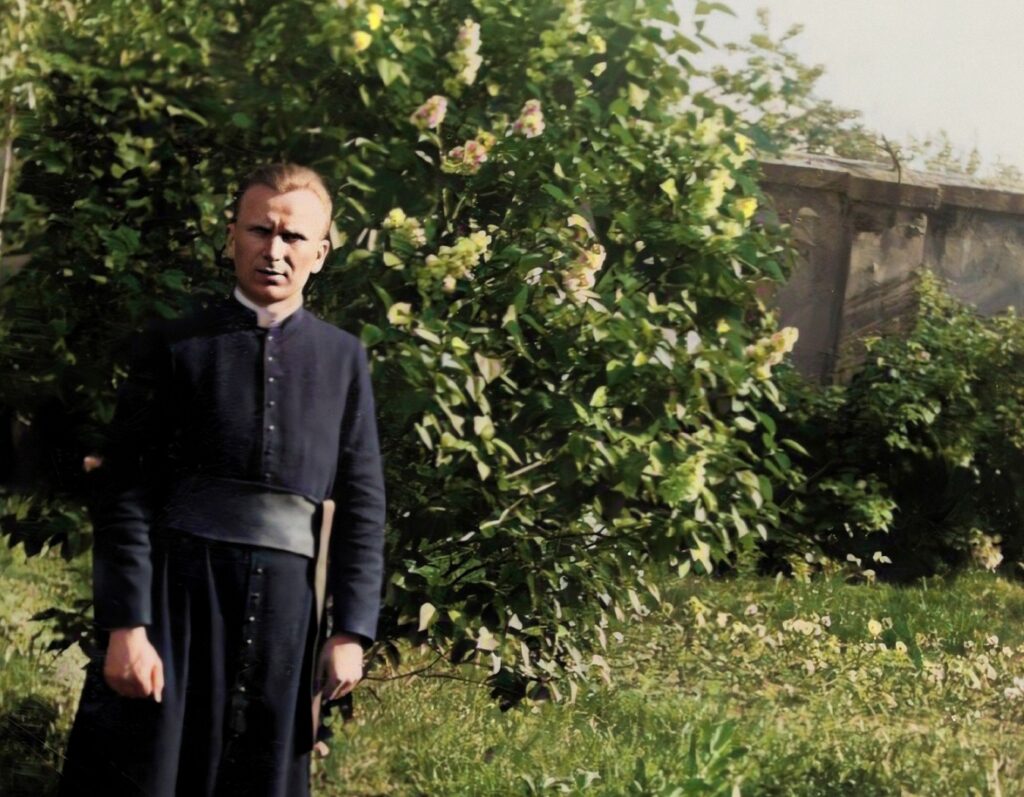
Fr Macha cred. Archive
*
„Getreu dem größten Gebot des Evangeliums, dem der Liebe, entschied sich der selige Johannes Francis Macha, obwohl er noch sehr jung war – in seinem achtundzwanzigsten Lebensjahr -, sein Leben für das Reich Christi hinzugeben“, sagte Kardinal Marcello Semeraro, Präfekt der Kongregation für die Seligsprechung in seiner Predigt während der Seligsprechung von P. Johannes Macha. Der junge polnische Priester von Oberschlesien wurde am 3. Dezember 1942 in Kattowitz von den Deutschen enthauptet. Fast 79 Jahre nach seinem Martyrium wurde er in der Kathedrale von Cristo Rey in Kattowitz zum Seligen ausgerufen.
In der Predigt, Card. Marcello Semeraro bezog sich auf die Worte des Johannesevangeliums: „Wenn das Weizenkorn zu Boden fällt und nicht stirbt, bleibt es allein; aber wenn es stirbt, bringt es viel Frucht“. Der päpstliche Legat betonte, dass das Zeugnis des seligen Pater Johannes Macha „in der Geschichte der Kirche in Oberschlesien eine Seite des wahrhaft heroischen Glaubens und der Liebe ist“. „Auch er starb wie das Weizenkorn: Er wurde von einem Nazisystem getötet, das voller Hass auf diejenigen war, die Gutes säten, um den Menschen von heute zu zeigen, dass die irdische Herrschaft vergeht, während das Reich Christi – dessen oberstes Gesetz das Gebot der Nächstenliebe ist – Bestand hat“, erklärte Kardinal Semeraro. Wie er sagte, war Pater Macha zwar nach menschlicher Logik vorzeitig gestorben, aber seine Hoffnung war von Unsterblichkeit und Frieden erfüllt.
Der Präfekt der Kongregation für die Selig- und Heiligsprechung erinnerte an die Biografie des neuen Seligen. Pater Johannes Macha wurde am 20. Januar 1914, zwei Tage nach seiner Geburt, in der Pfarrei der Heilige Maria Magdalena in Chorzów Stary getauft. In derselben Kirche feierte er am 27. Juni 1939, wenige Wochen vor Ausbruch des Zweiten Weltkriegs, seine Primiz. In den ersten Kriegstagen wurde er Vikar der Pfarrei St. Joseph in Ruda Ląska.
„Von den ersten Tagen seines Priestertums an stellte er sich daher in den Dienst des Nächsten und begab sich auf den Weg der heroischen Verwirklichung der Liebe, den Weg, der ihn später zum Opfer seines Lebens führen sollte“, betonte Kardinal Semeraro. Der päpstliche Legat unterstreicht das Engagement des jungen polnischen Priesters, all denen zu helfen, die durch die Aktionen der deutschen Besatzer geschädigt wurden. Wie er sagte, achtete Pater Macha nicht auf nationale, religiöse oder soziale Unterschiede.
„In einer gespaltenen Gesellschaft, in der sich Individualismus und Egoismus aufgrund des Mangels an echten und aufrichtigen Beziehungen immer mehr durchzusetzen scheinen, erinnert uns der Selige daran, dass Christus uns nach der Liebe und dem Gut, dass wir getan haben, richten wird“, sagte der Präfekt der die Kongregation für die Seligsprechung. Obwohl Pater Johannes Macha nach seiner Verhaftung durch die Gestapo verfolgt, geschlagen und misshandelt wurde, erinnerte er sich, blieb er in diesem langen Leiden „setzte er seine kompromisslose Bereitschaft zur Nachahmung des Meisters fort und akzeptierte seine eigene Verurteilung mit Gelassenheit“.
Von den Deutschen zum Tode verurteilt, wurde Pater Johannes Macha in der Nacht vom 2. auf den 3. Dezember hingerichtet. Wenige Stunden vor seiner Enthauptung schrieb der junge Priester in einem Brief an seine Familie die Worte, die sein Testament wurden: Ich habe nur kurze Zeit gelebt, aber ich glaube, ich habe mein Ziel erreicht. Verzweifeln Sie nicht. Alles wird gut werden. Auch ohne einen Baum bleibt der Wald ein Wald. „Johannes Franziskus Macha, der neue Selige, hat wie ein in jungen Jahren gefällter Baum den Grundstein für den Bau eines stabilen Hauses für künftige Generationen gelegt, denen er mit seinem Leben, das mit seinem Blut besiegelt ist, eine klare Botschaft gibt: ‚Niemand hat eine größere Liebe als diese, sein Leben für seine Freunde hinzugeben‘“, erklärte Kardinal Semeraro.
Der päpstliche Legat unterstreicht, dass die heutige Zeremonie von Pater Johannes Macha in gewisser Weise an die Oberschlesische Kirche zurückgibt. „Empfangen Sie ihn als Seligen, als Patron und Fürsprecher vor dem Herrn. Der Fürbitte des neuen Seligen können wir ein besonders herzliches Gebet für die Seminaristen und Priester, vor allem die jüngeren, anvertrauen“, sagte Kardinal Semeraro. Er lud auch die Gläubigen ein, auf die Fürsprache von P. Jean für die Anliegen der Familie und der Gesellschaft zu beten.
„Nehmt die Einladung dieses Priesters an, der heute zu den Ehren der Altäre erhoben wurde, um neue Räume für die Begegnung mit jungen Menschen zu öffnen und sie in den verschiedenen christlichen Lebensständen in den Dienst des Evangeliums zu stellen“, rief der Präfekt der Gemeinde sam Ende der Heiligsprechung. Er forderte die Gläubigen auch auf, die ersten Schritte auf dem synodalen Weg zu machen, den Papst Franziskus der Kirche in der ganzen Welt vorschlägt.
Abschließend ermutigte Kardinal Marcello Semeraro die Gläubigen, die Frömmigkeit des seligen Pater Johannes Macha nachzuahmen. Seine einzige Manifestation war die Tatsache, dass ein junger Priester während vieler Monate der Gefangenschaft Fadenstücke benutzte, um einen Rosenkranz zu weben.
Der päpstliche Legat besuchte die Pfarrei St. Maria Magdalena in Chorzów Stary, mit der der neue Selige verbunden war. Kardinal Semeraro besuchte auch das symbolische Grabmal des jungen Priesters. Nach zahlreichen Zeugenaussagen im Konzentrationslager Auschwitz wurde der Leichnam von Pater Johannes Macha wahrscheinlich nach seiner Enthauptung verbrannt.
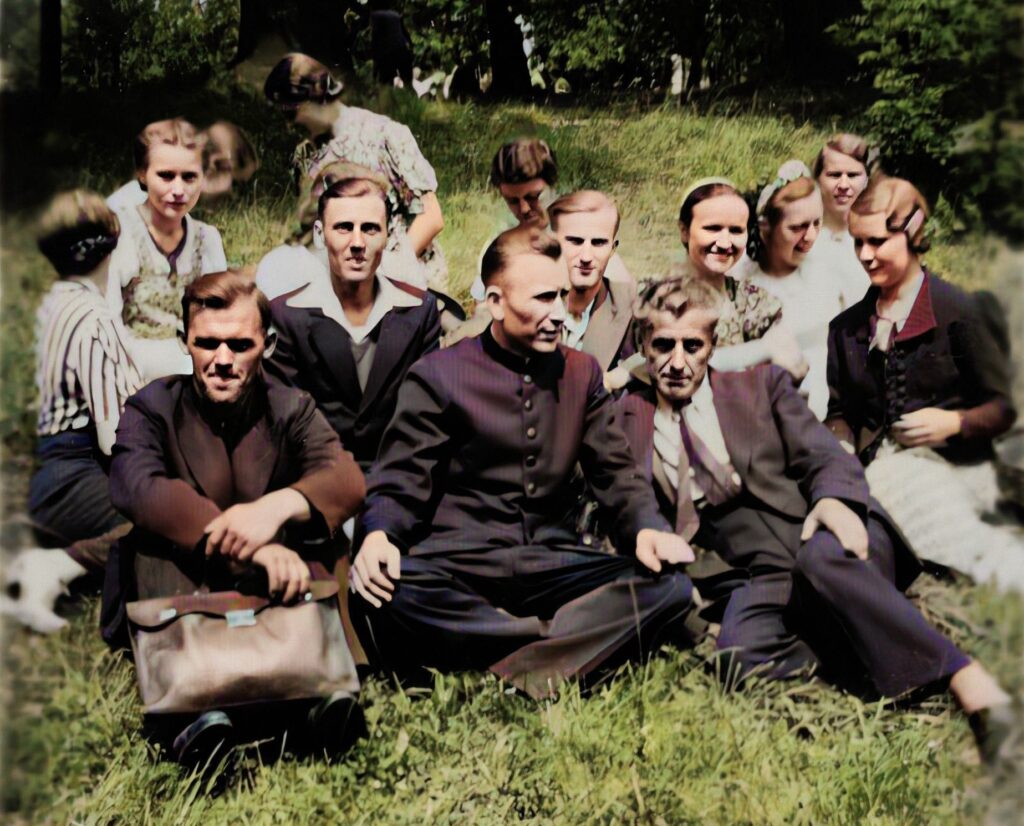
*
– Вірний найбільшій заповіді Євангелія, заповіді любові, блаженний Ян Францишек Маха, хоча й був дуже молодим – йому було лише 28 років – віддав своє життя за Царство Христове, – сказав кардинал Марчелло Семераро, префект Конгрегації в справах Святих у своїй проповіді під час беатифікації отця Яна Махи. Молодий польський священик з Верхньої Сілезії був страчений німцями через гільйотину 3 грудня 1942 року в Катовіце. Майже через 79 років після мученицької смерті він був проголошений блаженним у кафедральному соборі Христа Царя в Катовіце.
У проповіді кард. Марчелло Семераро посилався на слова Євангелія від св. Івана: «Коли зерно пшеничне, як у землю впаде, не помре, то одне зостається; як умре ж, плід рясний принесе». Папський легат наголосив, що свідчення бл. о. Яна Маха «в історії Церкви у Верхній Сілезії є сторінкою справді героїчної віри та любові». – Він також помер, як пшеничне зерно: був вбитий нацистською системою, повною ненависті до тих, хто сіє добро. Помер, щоб показати сучасній людині, що земне правління проходить, а Царство Христове, вищим законом якого є заповідь любові, триває – сказав кардинал Семераро. За його словами, навіть якщо о. Маха помер передчасно за людською логікою, його надія була сповнена безсмертя і миру.
Префект Конгрегації у справах святих нагадав біографію нового Блаженного. Отець Ян Маха був охрещений через два дні після народження, 20 січня 1914 року, в парафії св. Марії Магдалини в Старому Хожуві. У цьому ж храмі, 27 червня 1939 року, за кілька тижнів до початку Другої світової війни, він відслужив свою першу Святу Месу. У перші дні війни він став вікарієм у парафії св. Юзефа в Руді Шльонській.
– З перших днів свого священства він присвятив себе служінню ближньому, ставши на шлях героїчного здійснення любові, який згодом привів його до пожертвування власним життям, – сказав кардинал Семераро. Папський легат відзначив відданість молодого польського священика допомозі усім, хто потерпав від дій німецьких окупантів. За його словами, о. Маха не звертав уваги на національні, релігійні чи соціальні відмінності.
– У розділеному суспільстві, де, здається, індивідуалізм та егоїзм все більше зміцнюються через відсутність справжніх і щирих стосунків, наш Блаженний нагадує нам, що Христос буде судити нас, дивлячись на любов і добро, які ми зробили, – зазначив префект Конгрегації у справах Святих. Він нагадав, що хоча після того, як Гестапо арештувало о. Яна Маху, його били, переслідували і знущалися, саме в цих довгих стражданнях він «продовжив своє безкомпромісне бажання йти за Учителем, радісно приймаючи власну долю».
Смертний вирок о. Яна Махи був виконаний в ніч з 2 на 3 грудня. За кілька годин до страти на гільйотині молодий священик у листі до рідних записав слова, які стали його заповітом: «Я прожив коротке життя, але вважаю, що досяг своєї мети. Не впадайте у відчай! Все буде добре. Без одного дерева ліс залишається лісом». – Ян Францишек Маха, новий Блаженний, як дерево, зрубане в молодому віці, заклав основу для будівництва стабільного дому для майбутніх поколінь. Прикладом свого життя, запечатаним власною кров’ю, він передає ясне послання з Євангелія від св. Івана: «Ніхто не має більшої любові, як той, коли хто душу покладе за друзів», – сказав кардинал Семераро.
Папський легат наголосив, що сьогоднішня церемонія повертає о. Яна Маху до Верхньосілезької Церкви. – Приймаєте його як Блаженного, покровителя і заступника перед Господом. Ми не можемо не довірити заступництву новому Блаженному молитви за семінаристів і священиків, особливо за наймолодших, сказав кардинал Семераро. Він також закликав вірних молитися за заступництвом о. Яна за сім’ї та суспільства.
– Прийміть запрошення цього священика, піднесеного сьогодні на славу вівтарів, щоб відкрити нові простори для зустрічі з молодими людьми та залучення їх до служіння Євангелію в різних сферах християнського життя, – сказав префект Конгрегації в справах Святих. Він також попросив вірних зробити перші кроки на синодальному шляху, який Папа Франциск запропонував Церкві по всьому світу.
На закінчення, кардинал Марчелло Семераро заохотив вірних наслідувати побожність бл. о. Яна Махи. Унікальним проявом цієї побожності стало те, що молодий священик протягом багатьох місяців ув’язнення плів вервицю з ниток, щоб мати можливість на ній молитися.
Папський посланець відвідав парафію св. Марії Магдалини в Старому Хожуві, з якою був пов’язаний новий Блаженний. Кардинал Семераро також відвідав символічну могилу молодого священика. Згідно свідчень, тіло о. Ян Маха після страти на гільйотині, швидше за все, було спалене в концтаборі Аушвіц.
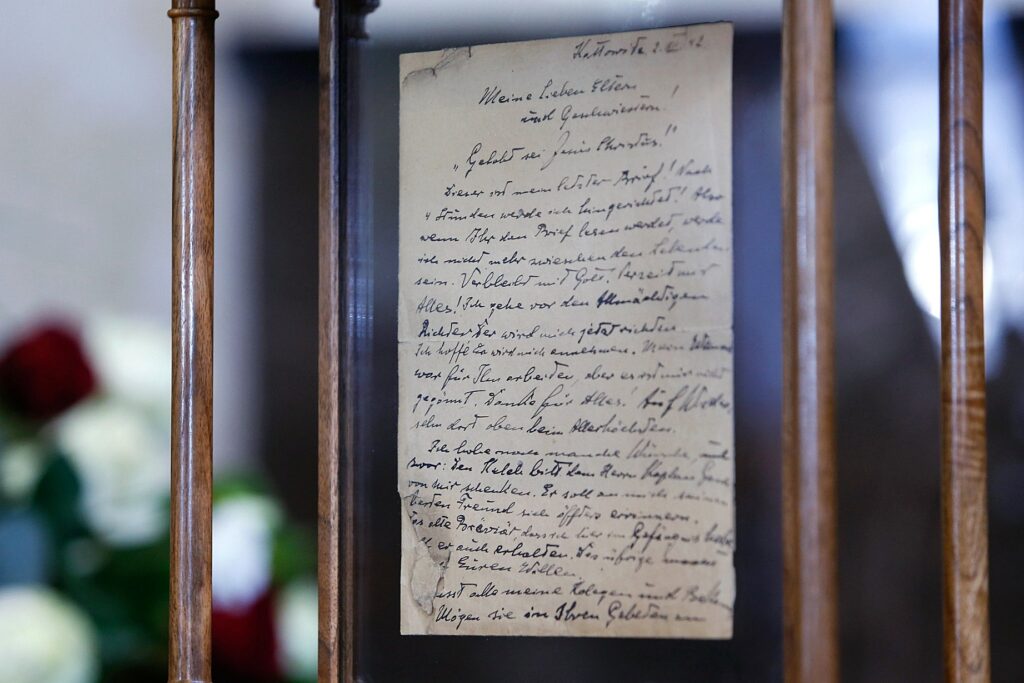
Relics_last_letter_of_Fr_Macha
Kard. Semeraro na beatyfikacji ks. Machy: jego świadectwo jest kartą heroicznej wiary i miłości >>>




Dodaj komentarz